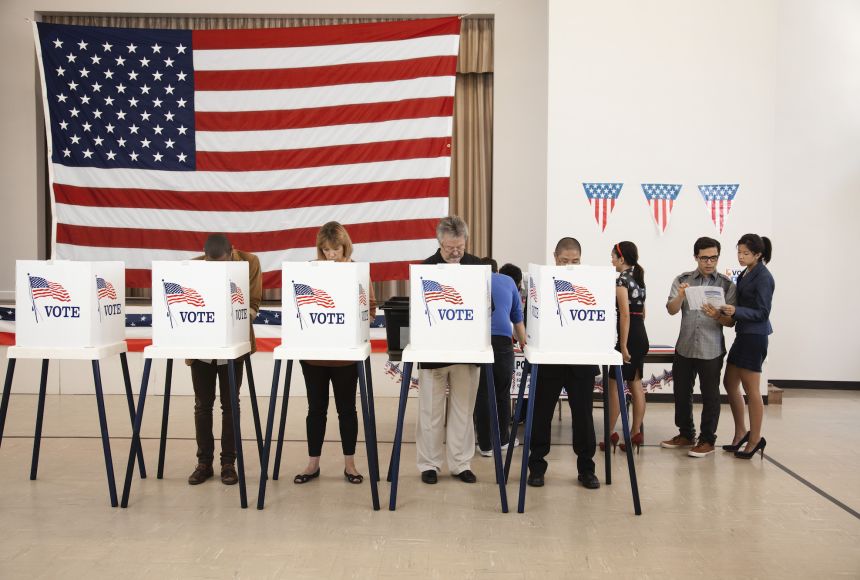Today, most American citizens who are 18 or over have the right to vote in federal and state elections. This has not always been the case.
The United States Constitution originally did not say who was allowed to vote, but it did explain how citizens would elect the new federal government. The members of the House of Representatives are to be elected directly through a popular vote. This means that each voter casts a ballot, and the candidate with the most votes wins. Members of the Senate were originally chosen by state legislatures, but that changed in 1913 to also allow people in each state to vote directly for them, too.
However, the Constitution says that the president should be chosen indirectly by a group called the Electoral College.
Each state has a number of delegates to the Electoral College. This number is based on the state's population. During the election, when one person wins the popular vote in a state, then they win all of the electoral votes for that state. Once all the votes are in, whichever candidate has the majority of electoral votes wins the election and becomes president. If one person does not have the majority, then the House of Representatives votes on who will become president.
Not All Adults Could Vote In Early America
When the Constitution was written, the question of who could vote was mostly left to the states. Through the early 1800s, only white male landowners were allowed to vote. Women, Blacks, and other disadvantaged groups of the time could not vote. These groups were denied the right to vote for many years to come.
Black men were not given the right to vote until 1870. That's when the 15th Amendment was approved. Even still, after 1870, Black men still faced major problems when they went to vote. They included poll taxes and literacy tests.
This continued until the 1960s. In 1964 the 24th Amendment was approved. It made poll taxes illegal. The next year, the Voting Rights Act of 1965 put an end to Jim Crow segregation laws.
No American women were allowed to vote until 1920. That was the year the women's voting movement was able to get the 19th Amendment approved by the states. It said that all women were allowed to vote. However, Black women would continue to face many obstacles to vote even after the 19th Amendment.
Most all Americans over the age of 21 could vote by the mid 1960s. The American voting age was lowered to 18 in 1971. At that time many Americans felt if you were old enough to serve your country in the military then you should be allowed to vote. Today, the voting age remains at 18. More Americans have voting rights now then in our Founding Fathers' day.
Does One Vote Really Make A Difference?
Do you sometimes think one person's vote cannot make much of a difference? Two of the closest elections in U.S. history might make you think again.
Al Gore narrowly lost the Electoral College vote to George W. Bush in 2000. Bush ended up winning Florida by only 537 votes. The election may have gone differently if 600 more Gore supporters showed up to vote. There may have been a different president from 2001-2009.
In 2016, Donald Trump won the Electoral College vote over Hillary Clinton by 304-227. The election did not come down to a handful of votes in one state as it did in 2000. However, Clinton actually won the national popular vote by nearly three million ballots. Trump, however, received enough electoral votes to win.
Trump won the popular vote in key areas of "swing" states like Wisconsin, Pennsylvania, and Michigan. Like most states, these have a "winner take all" system. That means the popular vote winner gets all the state's electoral votes. The loser gets none.
Votes In Local Elections Matter, Too
One voter may not directly elect the president. But when that vote is combined with others it can definitely make a difference. This is especially true in a particular voting district and in a close election.
Large numbers of voters usually turn out to elect a president. Far fewer people turn out for local elections. This means that fewer people have a say in who is elected to important offices like mayor or city council.
Being Involved In Politics
You can still get involved in elections even if you are not yet 18. The same is true if you are not a U.S. citizen. You may not be able to vote, but here are some actions you can take:
Be informed. Read up on issues (both local and national) that are important to you and figure out where you stand.
Get out and talk to people. Even if you cannot vote, you can still voice opinions on social media, in your school newspaper, or in other public places. You never know who might be listening.
Volunteer to work on a campaign. Support your favorite candidate. You can help with phone calls, door-to-door outreach, writing postcards, or volunteering at campaign headquarters. Your work can help get a candidate elected.
Taking part in free elections is one of the most important rights in American life. Many people in other countries do not have the same freedom. Neither did many Americans in our country's past. It is important to exercise your rights no matter what you believe or whom you support.
